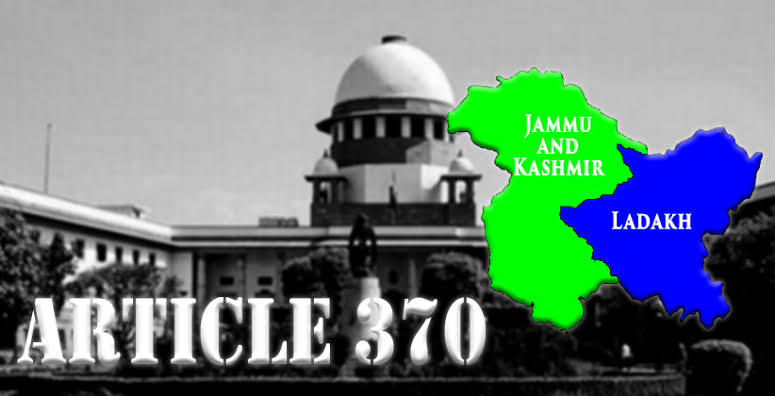
Supreme court of India on Wednesday will commence the hearing for the petitions challenging the abrogation of Article 370.
So far, the court has heard three petitioners including Kapil Sibal, Zaffar Shah and Gopal Subramaniam who said that the central Government had no authority to fiddle with Article 370 unilaterally.
Government of India abrogated the Articles 370 and 35a on August 05, 2019 and the erstwhile state was demoted into a union territory. Kashmir was out under months’ long lockdown and an internet ban was put in place.
Several petitions were filed in the Supreme court, however, the court recently agreed to hear the petitions on day-to-day basis starting August 02.
The five bench judge headed by Chief Justice of India is hearing at least 18 petitions. Several Kashmiris and Jammu residents reached the court to hear the arguments in the case.
Among those who visited the court to challenge and defend the decision was the former Chief Minister of Jammu Kashmir, Omar Abdullah who said, “I have high hopes from the court, we have come here on the behalf of Jammu Kashmir’s people. This is a matter of our identity.”
The Kashmiriyat has been providing you constant updates from the court. We also accessed the list of the petitions that will be heard tomorrow and the time each petitioner has been granted by the court.
On Wednesday, senior Advocate Dr. Rajeev Dhavan is elected to begin his arguments. Dr. Dhavan representing Jammu Kashmir People’s conference has been granted a time of two hours.
Following this, the solicitor general of India, Tushar Mehta is expected to provide his arguments to defend the Government’s move on August 05, 2019.
Here are the live updates
1030 A.M: People’s conference chief Sajad Lone reaches the Supreme Court along with other party leaders.
11 A.M: Dr. Dhavan: reads Article 3 & 4 and states that the articles plainly put in a conditionality – a conditionality emanating from the State itself. Can all this be wiped out?
11:10 A.M: Whatever is required to materialise 356, it must be related to that. “Necessary” or “desirable” are not carte blance powers of president. Could he have suspended Part III under 356? It has to be given a limited meaning.
11:30 A.M: When Maharashtra was broken, they said you have to refer. Likewise, Punjab- you have to refer the bill to the legislature of the state. You can’t self refer it to parliament like in case of Jammu Kashmir. It will collapse federalism, it will collapse the democracy in the state.
1130 A.M: Former chief Minister of Jammu Kashmir Mehbooba Mufti reaches the Supreme court.
1150 A.M: Article 356 certainly does not give a power to amend the constitution. Transferring powers to legislate is at the core of 356 and 357, argues Dr. Ranjhan.
1210 P.M: Dr Dhavan continues, Special status is not for Jammu Kashmir only but a regular feature of our constitution. Without these special provisions, nothing could have been done for SC, ST’s.
1225 p.m: Dr. Dhavan starts reading from the constitution. Reads special provisions to Sikkim, Nagaland and other states.
1250 P.M: The reason I am mentioning all this is to tell you, uniformity does not bind the country together, it is the diversity and this diversity is assimilated in our constitution. Had we not assimilated this diversity, we would have lost north-east India, argues Dr. Dhavan.
1255 P.M: now let me come to Article 370.
The bench rises up for lunch. “We will be here at 2,” says CJI.
2:05 P.M: The bench assembles post lunch. Dr. Dhavan resumes his argument.
2:10 P.M: Article 370 is a part and parcel of the multi symmetrical federalism that exists.
As president’s rule was in place, the government couldn’t use Article because you can’t substitute one legislature for another. And doing away with 370 because mandatory provisions of Constitution was illegal. As they do not say that parliament can do this or the president can do this.
2:30 P M: There was no Merger agreement signed by Jammu Kashmir with India, so we either continue sovereignty (Article 370) as stated in Premnath Kaul.
3:10 P M: Legally speaking, we cannot make sense of how article could be amended or abrogated when there was no assembly in place in Jammu Kashmir.




